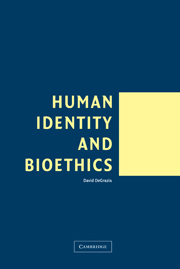Book contents
- Frontmatter
- Contents
- Acknowledgments
- 1 Introduction
- 2 Human Persons: Numerical Identity and Essence
- 3 Human Persons: Narrative Identity and Self-Creation
- 4 Identity, What We Are, and the Definition of Death
- 5 Advance Directives, Dementia, and the Someone Else Problem
- 6 Enhancement Technologies and Self-Creation
- 7 Prenatal Identity: Genetic Interventions, Reproductive Choices
- Index
3 - Human Persons: Narrative Identity and Self-Creation
Published online by Cambridge University Press: 05 June 2012
- Frontmatter
- Contents
- Acknowledgments
- 1 Introduction
- 2 Human Persons: Numerical Identity and Essence
- 3 Human Persons: Narrative Identity and Self-Creation
- 4 Identity, What We Are, and the Definition of Death
- 5 Advance Directives, Dementia, and the Someone Else Problem
- 6 Enhancement Technologies and Self-Creation
- 7 Prenatal Identity: Genetic Interventions, Reproductive Choices
- Index
Summary
Erik wasn't sleeping well. In fact, several hours before he went to bed each night, a feeling of dread about going to work the next day began to grow in him. He hated his job as a paralegal: the notion that time was well spent only if it could be billed to a client; the harassing (and lying) letters to members of the sheet-metal trust fund saying the law firm would sue in ten days if debts were not paid to the fund; phony lawyers pretending to care less about money and more about humanistic concerns than they did; the rigid hierarchy; the way lawyers procrastinated and then had to pull consecutive all-nighters right before a brief was due, spreading misery to everyone who worked with them; the use of the cliché “This is the real world” to justify every unethical act; the cruelty toward vulnerable coworkers such as secretaries and newcomers like Erik. No, Erik wasn't sleeping well. He was moderately depressed and very anxious. And his mind worked overtime when he was supposed to be sleeping.
“Should I quit my job?” he asked himself. “But I've long planned to go to law school. Assuming I do, wouldn't it make sense to get more legal work experience? And, if I can't handle my first job, what are my prospects for a legal career? Then again, maybe I'm just not cut out for work in corporate law.
- Type
- Chapter
- Information
- Human Identity and Bioethics , pp. 77 - 114Publisher: Cambridge University PressPrint publication year: 2005



